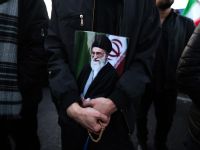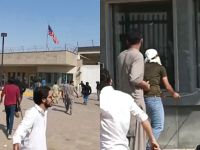By Munir K. Nasser
Washington, DC
US Secretary of State Madeleine Albright will travel to the Middle East next Monday to meet with Israeli Prime Minister Ehud Barak and Palestinian President Yasser Arafat in order to facilitate their efforts to reach agreement on permanent status issues, a state department official told Albawaba.com.
The official, who asked not to be identified, said “if sufficient movement has been attained in the negotiations, at some point in time it may be necessary to bring the parties together with the President in Washington.”
When asked about the possibility of holding such a summit before the end of June, the official said that Albright would take at least two trips to the region before the possibility of a summit could be considered. He added that the meetings in the region will take place on Monday and Tuesday, and after that President Clinton will decide when Arafat will come to Washington. He said no date has been set for Arafat’s visit, but it would be expected early next week.
PURPOSE OF VISIT IS ASSESSMENT OF NEGOTIATIONS
According to him, the purpose of Albright’s trip “is not to negotiate the sticking points between the parties, but simply to sit down with them and try to assess in greater detail what stage they are at, and what we can do to bring them closer together.” He insisted that the Clinton Administration will not present new ideas or bring a package to them, but it is more to follow up on the Clinton-Barak meeting. Then a decision will be made whether to invite them to Washington.
The source noted that Arafat has an invitation on the table, and he will come and then Secretary Albright will take another trip to the region to see if they are ready to be brought back for the summit. “If things have moved along sufficiently, then possibly the bigger summit will take place,” he said.
The official refused to discuss the details of the sticking points between the parties, saying “we don’t get drawn into discussing what is circulating in the press about Barak’s willingness to give up 90 percent of the West Bank.”
JORDAN’S KING US VISIT IRRELEVANT TO NEGOTIATIONS
When asked about Jordan’s King Abdullah’s visit to Washington next week and whether he will play a role in the final status negotiations between Israel and the Palestinians, the official said the King’s visit has nothing to do with Arafat’s visit. He explained that “While the King of Jordan has always been supportive of our peace process efforts, and still does play a role in talking to the parties and providing advice and support, we should not draw a link between the King’s visit and Arafat’s visit, it is just a matter of timing. The King will be here to further coordinate on the peace process and also to discuss the US-Jordanian relationship, but his trip will not have a negotiating aspect.”
US OFFICIAL IN LISBON: IT’S PREMATURE TO HOLD SUMMIT AT CURRENT PEACE TALKS SITUATION
Meanwhile, a senior US Administration official traveling with President Clinton told reporters in Lisbon, Portugal that the Israelis and Palestinians are not at a point where the basis is sufficiently laid to be able to invite them to a summit in Washington.
The senior official, who spoke on condition of anonymity following Clinton-Barak’s meeting in Lisbon Thursday, said Secretary Albright will make a trip to the region to make a judgment whether a summit is necessary. “We're not at a point, we don't see, we don't believe, where the basis is sufficiently laid to be able to go to that kind of a summit,” he said.
He stressed that “we are dealing with the most fateful issues there are between Israelis and Palestinians. The issues of permanent status, borders, settlements, refugees, Jerusalem, security arrangements -- all of these issues go to the heart of identity, existence and security, and these are very tough negotiations, to be sure, given how profound the issues are. But there is no question that what we have seen is, at least in the negotiations, there is a chance to overcome the differences.”
The official pointed out that only during the last three to four weeks that the negotiations have started to show results. “I have seen the kind of -- what I would describe as serious business going on. So what you're really dealing with at this point is being able to go to the heart of the matter.”
CLINTON BELIEVES PARTIES WILL MEET SEPTEMBER DEADLINE
When asked whether President Clinton still believes that a September 13th target date to sign an agreement is realistic, the official confirmed that he does. “I believe that he thinks it is possible to reach an agreement. I think he has no illusions. I think on the one hand, the President is quite hopeful, because he sees the level of intent on each side. On the other hand, he's quite mindful of how difficult these issues are for both sides, how difficult the decisions are for both leaders,” he said.
.
The senior official said the Clinton Administration is focused much more on dealing with “what we have seen in the negotiations that indicate that both sides are quite serious about trying to find ways not only to overcome the differences, but I will say, one thing that clearly characterizes this track, and has, is that both sides make much more of an effort to try to take account of the other side's needs, not only their own needs.”
He refused to go into the specifics of the negotiations but said “both sides have signaled to each other and to us that they're prepared to try to take account of the needs of the other, as well as meeting their own needs.” He noted that Prime Minister Barak “is very much governed by what Israel needs for security, but he's also mindful that if you're going to reach a deal you're going to have to make some painful decisions. And that he signaled to us and he certainly has signaled that to his own public.”
DOOR IS OPEN FOR SYRIA’S RETURN TO NEGOTIATION TABLE
In a response to a question about the impact of the latest developments on the Syrian track and whether President Assad might feel motivated to start talking, the senior official said that the latest developments in the region that changed the landscape have provided an opportunity for Syria. “I think in the aftermath of the Israeli withdrawal from Lebanon, you have a new situation that may also create new possibilities”, he added. “We have never closed the door on the Syrian track. We've made that very clear. We have stayed in communication with the Syrians. They haven't closed the door and we haven't closed the door. So we continue to believe that there is a possibility there” -- Albawaba.com
© 2000 Al Bawaba (www.albawaba.com)







